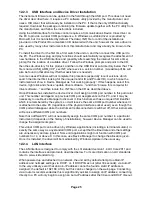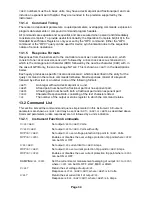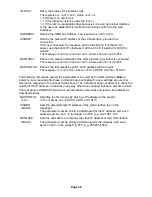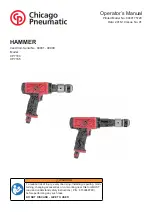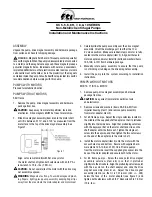
Page 37
*TRG
The product has no trigger capability. The command is ignored in this
instrument.
† Note: this command potentially requires a range change that may not be possible because
>0.5V is still present on either output 1 or output 2 terminals at the time the command is
executed; see section 7.6 for more information. In the event of failure, the Execution Error bit is
set in the ESR register and the error code 104 is set in the EER register; see section 12.2.7. It
is strongly recommended that these registers are checked following the use of this command.
13.2.3
Status Commands
*CLS
Clear Status. Clears all status indications, including the Status Byte.
Does not clear any Enable Registers.
LSR<
N
>?
Query and clear the Limit Status Register<
N
>. The response format is
<
NR
1><
RMT
>. See Status Reporting section for details of the response.
LSE<
N
> <
NRF
>
Set the Limit Status Enable Register<
N
> to <
NRF
>
LSE<
N
>?
Returns the value in the value in the Limit Status Enable Register<
N
>.
The response format is<
NR
1><
RMT
>.
EER?
Query and clear Execution Error Register. The response format is
<
NR
1><
RMT
>.
QER?
Query and clear Query Error Register. The response format is
<
NR
1><
RMT
>.
*STB?
Report the value of the Status Byte. The response is: <
NR
1><
RMT
>.
Because there is no output queue, MAV can only be read by a GPIB serial
poll, not by this query, as any previous message must have already been
sent.
*SRE <
NRF
>
Sets the Service Request Enable Register to <
NRF
>
*SRE?
Report the value in the Service Request Enable Register.
The response is <
NR
1><
RMT
>.
*PRE <
NRF
>
Set the Parallel Poll Enable Register to the value <
NRF
>.
*PRE?
Report the value in the Parallel Poll Enable Register.
The response is <
NR
1><
RMT
>.
*IST?
Returns the state of the
ist
local message as defined by IEEE Std. 488.2.
The response is 0<
RMT
> if the local message is false, or 1<
RMT
> if true.
13.2.4
Interface Management Commands
LOCAL
Go to local. Any subsequent command will restore the remote state.
IFLOCK
<
NRF
>
Set or Clear the lock requiring the instrument to respond only to this
interface, where <
NRF
> has the meaning: 0 = clear and 1 = set the lock.
It is an Execution Error (number 200) if the request is denied either because
of conflict with a lock on this or another interface, or the user has disabled
this interface from taking control using the web interface.



